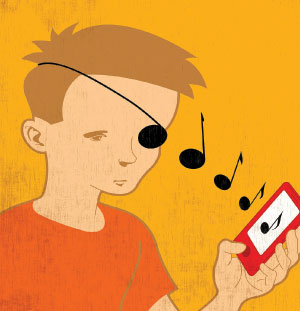
To Pay or Not to Pay?
How to talk to your guys about the dilemma of downloading.
Illustration by Thomas Fuchs
Last year, the British research firm Human Capital surveyed 1,000 people between the ages of 15 and 24 on their attitudes toward music. The results were disturbing, if not surprising. “For this generation, free music is prevalent, easily reached, and largely guilt-free,” the report concluded. In fact, 61 percent of respondents said they didn’t think they should have to pay for the music they listen to, a number that rose to 69 percent among 15 to 19 year olds.
 Attitudes like that suggest why music sales continue to fall, dropping 18 percent from 2007 to 2008, according to the Recording Industry Association of America. But music piracy represents more than just an economic issue; it’s also an ethical issue. And it’s one that goes beyond the Top 40. After all, if you get your music free, why not get your term papers free, too?
Attitudes like that suggest why music sales continue to fall, dropping 18 percent from 2007 to 2008, according to the Recording Industry Association of America. But music piracy represents more than just an economic issue; it’s also an ethical issue. And it’s one that goes beyond the Top 40. After all, if you get your music free, why not get your term papers free, too?
Dr. Tony Aretz, a longtime Scouter and president of the College of Mount St. Joseph in Cincinnati, knows the dilemma well. “We get students in class who don’t see any problem taking something from a Web site, putting it in a paper, and not attributing it to its original source,” he says. “It’s mind-boggling.”
Copyrights and Wrongs
Part of the problem, Aretz says, lies in the Internet’s free-for-all nature, where users get all sorts of content free—even information from newspapers that they would have to pay for in the real world. Bands like Radiohead have further complicated the situation by giving their music away or offering it on a “pay what you want” basis.
Then there are the complexities of copyright law. If you buy an album on iTunes, you can burn it to a CD for your own use. However, if you buy a CD and lose it, you can’t legally download the album without paying for it a second time.
Adults usually can navigate such distinctions. But adolescents can’t, according to Aretz. “They’re a group that looks at the world as very black and white; they don’t see gray,” he says. “And the way people who can’t see gray deal with gray is that they force it into their black-and-white world, even if it’s incorrect.”
Teach the Principles
So how can Scouters teach ethical behavior related to music downloading? One way: Set a good example. When you haul around Scouts in your car, for example, only play CDs that you’ve purchased. If you play CDs that you’ve burned—even if they’re legal—your Scouts may not recognize the difference between those and the pirated CDs friends have given them.
Also, try talking about the issue in Scoutmaster minutes and other settings. Piracy relates to the concept of honor, but Aretz points out that it also relates to bravery. “Technology makes it easier to be dishonorable in some ways. Therefore, you have to have more courage to act honorably.”
Aretz recommends getting your Scouts to think about times when their own intellectual property has been stolen—perhaps when a classmate asked to copy their homework. “They have to see it from their own perspective because that’s how they view the world,” he says.
Free Curriculum
If you want to delve deeper into the issue, several trade groups offer free (and legal) curriculum resources on the Internet that you can adapt for use in Scouting. Start with the Copyright Alliance Education Foundation’s Web site, copyrightfoundation.org. You’ll find an extensive list of curriculum resources grouped by target age, as well as a glossary and answers to frequently asked questions about copyright law. Also, check out musicunited.org. It includes links to legal sources for online music and a lengthy list of quotations from artists on the negative impact of piracy.
Legendary tenor Luciano Pavarotti said it well: “Artists and composers—particularly the younger ones—will not stand a chance of creating music in the future if their recordings are simply stolen in this way.”